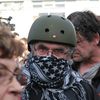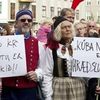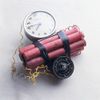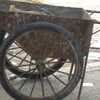Arik Ascherman: Rabbi-activist for the rights of Israelis, Palestinians, and foreign workers in Israel
By Rabbi Arik W. Ascherman on June 4, 2007 - י"ח סיון תשס"ז
"Sometimes, when you have tried everything else, and particularly when you see the values that we are sworn to uphold as rabbis being trampled on, you have no choice but to stand in front of the bulldozers, to exercise that democratic right of civil disobedience to try to have the opportunity in court to show that it's the law, the policy, that's really illegal and immoral."
Arik Ascherman is Executive Director of Rabbis for Human Rights in Israel. His personal journey has evolved from acquiring a Harvard education to standing trial in Israel for blocking home demolitions.
Born in Erie, Pennsylvania, Ascherman graduated from college in 1981. From then until 1983, he worked for Interns for Peace, a community work program in Israel involving Jews and Arabs. For most of this time, Ascherman lived in the Arab village of Tamra.
In 1989, he was ordained as a rabbi in the U.S. at the Hebrew Union College-Jewish Institute of Religion. During his training, he worked with soup kitchens and homeless advocacy in Israel. Following his ordination he worked as a rabbi and with Hillel chapters in the U.S. In Israel, he was director of Congregation Mevakshei Derech and was the part time rabbi of Kibbutz Yahel, a Reform kibbutz near Eilat.
He became a citizen of Israel in 1994, where he lives with his wife, Einat Ramon, the first Israeli-born woman to be ordained as a rabbi, and their two children.
Beginning in 1995, Arik Ascherman became co-director of Rabbis for Human Rights (RHR); becoming executive director in 1998. RHR is the only organization in Israel made up of rabbis and rabbinical students from all denominations of Judaism. It promotes justice and human rights for Israelis, Palestinians, and foreign workers. In May 2006, RHR received the prestigious Niwano Peace Prize.
Over the next few years, his commitment to human rights led him to nonviolent resistance to block bulldozers from destroying Palestinian homes. As a result of his actions, Ascherman was charged with "interfering with police performance of duties on two different occasions in 2003, and the intention to commit acts to prevent police from performing their duties." During his trial Ascherman explained his actions,
"I arrived at the homes for which I am on trial today carrying in my heart all the families in whose name I stand before you - the families that suffered and continue to suffer because of the home demolition policy. I held in my heart the looks of the children in Shufafat who had gone off to school in the morning and returned to discover their home demolished, with a toy or book peaking through the rubble ... I held in my heart the frightened looks of families sitting on packed suitcases waiting for the bulldozers to arrive, the grown men crying and the tens, if not hundreds of families whom I have spent time with before, during and after home demolitions."
In March 2005, a magistrate court found Ascherman guilty but said that he wouldn't have a criminal record. Upon his conviction, Ascherman said that he was disappointed the court did not address the injustice of home demolitions in its verdict.
"For us, this trial really was about the people who have no voice here, the victims of home demolition," Ascherman said. "And that's why we're going immediately from the courthouse...to begin the rebuilding of one of these homes."
Recent protests by Ascherman and Rabbis for Human Rights have focused on the separation wall. In 2006, RHR achieved a major victory when it won a lawsuit to prevent the wall construction from dividing the village Sheikh Sa'ad.
from Profiles of Peace: http://www.afsc.org/israel-palestine/profiles-of-peace/arik-ascherman.htm
Stjórnmál og samfélag | Breytt 25.7.2008 kl. 00:35 | Slóđ | Facebook | Athugasemdir (0)
Stjórnmál og samfélag | Breytt s.d. kl. 23:21 | Slóđ | Facebook | Athugasemdir (2)
24.7.2008 | 18:50
Í hvađa tímariti?
Ţetta er náttúruleg háalvarlegt mál, sem gott vćri ađ frćđast meira um, ţannig ađ mbl.is hefđi mátt geta ţess í hvađa tímariti niđurstöđurnar verđa birtar. Ţó sjálfsagt megi finna ţađ út Mig hefur reyndar alltaf grunađ ađ Fćreyjingar vćru svolítiđ eitrađir á sinn ljúflega hátt!
P.s. En er ekki öllum fjandans sama, hvort Snorri Bergs étur fisk eđa ekki?

|
Eiturefni berast úr hvölum í Fćreyinga |
| Tilkynna um óviđeigandi tengingu viđ frétt | |
24.7.2008 | 18:40
Hér er eitthvađ ađ!

|
Allsnakinn á Esjunni í 600 metra hćđ |
| Tilkynna um óviđeigandi tengingu viđ frétt | |
Stjórnmál og samfélag | Breytt s.d. kl. 18:52 | Slóđ | Facebook | Athugasemdir (1)
24.7.2008 | 18:20
Ísrael: Hermenn notađir sem tilraunadýr í lyfjatilraunum!
Health Ministry to supervise IDF medical experimentation
Human medical experimentation may no longer be conducted in the Israel Defense Forces without Health Ministry supervision and the observance of "informed consent" guidelines similar to those relevant to clinical experiments in the civilian population.
This achievement, initiated by the Physicians for Human Rights-Israel organization and veterans who presented their case before the High Court of Justice, will be in effect now without a law, and go "on the books" when a government bill on clinical trials is passed by the Knesset.
Among the examples of such experimentation were soldiers who had "volunteered" to be tested with experimental antidotes against anthrax, nerve gas and other toxic substances. Clinical trials have been going on in the IDF for decades, with soldiers formally having to "volunteer" but many actually being pressured to agree to be accepted to elite fighting units or to get certain privileges.
The participants were in many cases not informed what pills or other substances they were taking or about the possible risks. Those whose lawyers filed the case claimed that although they were completely healthy when joining the military, they suffered from acute symptoms immediately after taking them for several days and developed chronic disorders less than a decade or two after their discharge from service.
The physicians' group expressed its satisfaction with the agreement, except the state's refusal to halt immediately all experimentation on soldiers and allow its resumption only when the bill is passed in the Knesset. In the interim, a modified version of existing ministry supervision procedures will apply to experimentation by the IDF Medical Corps as well.
The Medical Corps has just opened a special office for accepting health complaints of participants in medical experiments, informing them exactly what substances were tested on them and receiving requests for disability payments.
In a few days, an order by the ministry director-general's office will be recognized as an official IDF order to be observed throughout the military.
The Israel Medical Association, which set up an investigation committee after such complaints were voiced by some veterans, declined to make public the protocols from the committee meetings. The IMA, whose committee has completed 90 percent of their work, claimed that doing so would interfere with the committee's deliberations.
Stjórnmál og samfélag | Breytt s.d. kl. 18:29 | Slóđ | Facebook | Athugasemdir (0)
24.7.2008 | 18:10
Gyđingar ofsćkja Gyđinga í Ísrael.
Messianic Jews say they are persecuted in Israel
![]()
The Associated Press
Published: June 21, 2008
![]()
![]()
![]()
![]()
![]()
![]()
![]()
![]()
![]() Text Size
Text Size
![]()
![]()
TEL AVIV, Israel: Safety pins and screws are still lodged in 15-year-old Ami Ortiz's body three months after he opened a booby-trapped gift basket sent to his family. The explosion severed two toes, damaged his hearing and harmed a promising basketball career.
Police say they are still searching for the assailants. But to the Ortiz family the motive of the attackers is clear: The Ortizes are Jews who believe that Jesus was the Messiah.
Israel's tiny community of Messianic Jews, a mixed group of 10,000 people who include the California-based Jews for Jesus, complains of threats, harassment and police indifference.
The March 20 bombing was the worst incident so far. In October, a mysterious fire damaged a Jerusalem church used by Messianic Jews, and last month ultra-Orthodox Jews torched a stack of Christian holy books distributed by missionaries.
Israel's Foreign Ministry and two chief rabbis were quick to condemn the burning, but the Ortiz family says vigorous police action is needed.
"I believe that it will happen again, if not to us, then to other Messianic believers," said Ami's mother, Leah Ortiz, a 54-year-old native of South Orange, N.J.
Proselytizing is strongly discouraged in Israel, a state that was established for a people that suffered centuries of persecution for not accepting Jesus and has little tolerance for missionary work.
At the same time, Israel has warm relations with U.S. evangelical groups, which strongly support its cause, but these generally refrain from proselytizing inside Israel. Even the Mormon church, which has mission work at its core worldwide, agreed when it opened a campus in Jerusalem to refrain from missionary activity.
"Historically the core of Christianity ... was 'convert or die,' so it was seen and is still seen as an assault on Jewish existence itself," said Rabbi David Rosen, who oversees interfaith affairs for the American Jewish Committee. "When you are called to join another religion, you are being called on to betray your people."
Messianic Jews consider themselves Jewish, observing the holy days and reciting many of the same prayers. The Ortiz family lights candles on the Jewish Sabbath, shuns pork and eats matzoth on Passover.
Ami Ortiz, interviewed at the Tel Aviv hospital where he is being treated, comes across as no different from any Jewish Israeli his age. He's a sabra, or native-born Israeli, who speaks English with a Hebrew accent, has an older brother in an elite Israeli army unit and was hoping to join the youth squad of Maccabi Tel Aviv, a league-topping basketball team.
But his religion also holds that one can embrace Jesus - Ami calls him by his Hebrew name, Yeshua - as the Messiah and remain Jewish. Orthodox Jews, on the other hand, believe that the Messiah has yet to come, that he will do so only when he chooses, and that any attempt to pre-empt his coming is a grievous sin.
Rabbi Sholom Dov Lifschitz, head of the ultra-Orthodox Yad Leahim organization that campaigns against missionary activity in Israel, says Messianic Jews give him "great pain."
"They are provoking ... it's a miracle that worse things don't happen," he said.
Messianic activists appear to have had some success among couples with one non-Jewish spouse, as well as immigrants from Ethiopia and the former Soviet Union who have loose ties to Judaism.
Or Yehuda, a town in central Israel with many immigrants as well as ultra-Orthodox Jews including a deputy mayor, Uri Aharon, was the scene of the May 15 book-burning.
Ami Dahan, a local police official, says hundreds of Christian religious books were burned on May 15 in an empty lot in town. He said Deputy Mayor Uzi Aharon, has been questioned on suspicion that he instructed youths to collect the books from homes where they had been distributed and told them to burn them.
Aharon denies ordering the burning. He says the books were collected from a neighborhood of mostly Ethiopian immigrants who are easily persuaded by missionaries.
"There are three missionaries who live and work in the town, and every Saturday they take people to worship and try to brainwash them," Aharon said.
Many Messianic Jews say they recognize the sensitivities involved and do not distribute religious material or conduct high-profile campaigns. But Aharon noted a recent "Jews for Jesus" campaign with signs on buses that equated two similar Hebrew words - "Jesus" and "salvation." Public outrage quickly forced the bus company to remove the signs.
Lawyer Dan Yakir of the Association for Civil Rights in Israel says the law allows missionaries to preach provided they don't offer gifts or money or go after minors.
"It is their right according to freedom of religion to maintain their religious lifestyle and disseminate their beliefs, including through literature," he said.
But the obstacles are evident, raised not just from religious activists but by the state.
Calev Myers, a lawyer who represents Messianic Jews, said he has fought 200 legal cases in the past two years. Most involve authorities' attempts to close down houses of worship, revoke the citizenship of believers or refuse to register their children as Israelis. In one case, Israel has accused a German religion student of missionary activity and has tried - so far unsuccessfully - to deport her.
In incidents of violence, police are reluctant to press charges, Myers said.
The book-burning caused shock among U.S. evangelicals.
Dave Parsons, spokesman of the International Christian Embassy in Jerusalem, which represents evangelical Christian communities, said the test would be how vigorously authorities pursued the case.
"We believe there is a link to a series of incidents here in the land that involve harassment, intimidation and physical violence," he said.
The Ortiz family moved from the United States to Israel in 1985, qualifying as immigrants under Israel's Law of Return because Leah, the mother, is Jewish. In 1989 they moved into Ariel, a Jewish settlement in the West Bank, and established a small Messianic group which now numbers 60, most of them immigrants from the former Soviet Union, according to David Ortiz, the pastor and Ami's father.
He said that he built the community through conversations with friends and neighbors, but did not actually go door-to-door distributing religious material to strangers in the traditional sense of missionary work. David Ortiz says he has also proselytized in the Palestinian areas - prompting Islamic leaders there to warn against contact with him. Ortiz said he had "no problem" if Messianic Jews discuss their religious views with others and persuade them to believe in Jesus.
When the family began holding study sessions, a rabbi warned Ortiz not to speak about Jesus outside the home.
In 2005, fliers were distributed in Ariel warning that there were believers of Jesus in the community. One day, two men wearing the black skullcaps of Orthodox Jews knocked on the door and photographed Ortiz when he answered. Recently the photo turned up on a flier with the family's address.
When the basket was left at the door Ami wasn't surprised, since it was Purim, a holiday when Jews exchange gifts.
"I opened it up and I heard it and then I was on the floor and I didn't hear anything, I didn't see anything," the lanky boy recalls.
Ami was in critical condition, with severe gashes in his legs and feet and one that just missed his jugular vein. His tryout for the Maccabi team was canceled.
His family initially suspected Palestinians; Ariel is in the heart of the West Bank and surrounded by Palestinian towns and villages and, like most Jewish settlements, has been the target of Palestinian attacks (Ţetta eru mjög athyglisverđ viđbrögđ. Í frétt hér ađ neđan um flugskeytaárás landtökumanns koma fram sömu viđbrögđ. Spurning, hversu oft röngum ađila, ţ.e. Palstínumönnum er kennt um. Athugasemd mín APG). But police immediately told him the bomb was more sophisticated than those made by Palestinians since it contained plastic explosives.
"Nobody ever suspected that a Jewish group would do such a thing, that they would put a bomb in somebody else's house," David Ortiz said.
Police have since told the family that Palestinians were not behind the bombing. The family has footage from a security camera of a man delivering the package, according to a person close to the family who spoke on condition of anonymity because police say disclosing details could harm the investigation.
Police spokesman Danny Poleg would not discuss the case, saying only that no arrests have been made.
Meanwhile, the Messianic Jewish believers are taking no chances. These days they worship under the protection of an armed guard.
![]()
Stjórnmál og samfélag | Breytt s.d. kl. 18:12 | Slóđ | Facebook | Athugasemdir (0)
24.7.2008 | 12:45
Ófriđur í uppsiglingu?

|
Segja norđurskautiđ olíuríkt |
| Tilkynna um óviđeigandi tengingu viđ frétt | |
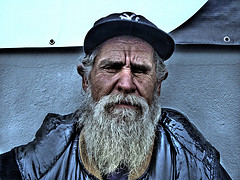

 dolli-dropi
dolli-dropi
 malacai
malacai
 bjarnihardar
bjarnihardar
 brandurj
brandurj
 ea
ea
 killjoker
killjoker
 coke
coke
 vglilja
vglilja
 gudrunmagnea
gudrunmagnea
 neytendatalsmadur
neytendatalsmadur
 veravakandi
veravakandi
 hehau
hehau
 gorgeir
gorgeir
 hlynurh
hlynurh
 disdis
disdis
 ingabesta
ingabesta
 jevbmaack
jevbmaack
 palmig
palmig
 joiragnars
joiragnars
 manisvans
manisvans
 stebbifr
stebbifr
 svanurg
svanurg
 vefritid
vefritid
 vestfirdir
vestfirdir
 para
para
 hreinsamviska
hreinsamviska
 kreppukallinn
kreppukallinn
 veffari
veffari
 arnith
arnith
 icekeiko
icekeiko
 andres08
andres08
 skagstrendingur
skagstrendingur
 gattin
gattin
 skulablogg
skulablogg
 haugur
haugur
 heimssyn
heimssyn
 snjolfur
snjolfur
 kreppan
kreppan
 kamasutra
kamasutra
 ksh
ksh
 larahanna
larahanna
 raudurvettvangur
raudurvettvangur
 siggisig
siggisig
 siggith
siggith
 lehamzdr
lehamzdr
 vest1
vest1
 iceberg
iceberg
